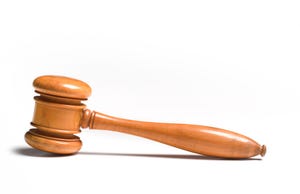IP Watch: Medtronic’s Endeavor Inducted into Stent Wars
March 1, 2008
The Endeavor stent system by Medtronic Inc. (Minneapolis)—the first drug-eluting stent to be approved by FDA since 2004—spent only three weeks on the U.S. market before being drawn into its first patent infringement lawsuit. In late February, Wyeth (Madison, NJ) and Cordis Corp. (Miami Lakes, FL), a Johnson & Johnson company, filed suit against Medtronic in the U.S. District Court for the District of New Jersey. The suit alleges that the zotarolimus-eluting Endeavor stent infringes three patents owned by Wyeth and licensed exclusively to Cordis.
The suit hardly comes as a surprise, as industry players in the drug-eluting stent field have been embroiled in a multitude of legal disputes ever since the product category first emerged in the marketplace half a dozen years ago.
The three patents in question in the Wyeth-Cordis suit—referred to as the '781, '146, and '728 patents—are related to the use of rapamycin (sirolimus) and its analogues, including zotarolimus. Cordis markets the Cypher sirolimus-eluting stent, which received FDA approval in 2003. Prior to the launch of Endeavor, Cypher's only U.S. competitor was the Taxus paclitaxel-coated stent from Boston Scientific Corp. (Natick, MA), which hit the U.S. market in early 2004.
Medtronic's Endeavor received the CE mark in 2005 and is currently available in more than 100 countries around the world. And just days ago, Medtronic announced that Endeavor has also received regulatory approval from Health Canada. The company expects to begin commercial sales of the stent in Canada by the end of this month.
Medtronic acknowledged the Wyeth-Cordis lawsuit in a March 4 Securities and Exchange Commission filing, stating, “The same three patents are the subject of a pending arbitration between Medtronic and J&J, in which Medtronic asserts that it is licensed to the three patents under a 1997 agreement with J&J and also that J&J has covenanted not to sue Medtronic on the three patents. An arbitration panel has been selected, but a hearing date has not been scheduled. Additionally, [Medtronic] believes it is indemnified for the claims made by Wyeth and Cordis.”
Medtronic also indicated that it has not recorded an expense related to potential damages in connection with the lawsuit because “any potential loss is not currently probable or reasonably estimable.”
The Wyeth-Cordis suit alleges that Medtronic's infringement is willful and deliberate, a determination that would enable the plaintiffs to collect treble damages in the event of a victory. The companies are also seeking preliminary and permanent injunctions against U.S. sales of Endeavor. Although willful infringement claims and injunction requests are standard elements in patent infringement suits, both are rarely granted.
Indeed, if previous patent disputes in the ever-turbulent stent market are any indicator, it could be years before the Wyeth–Cordis–Medtronic battle nears anything resembling a resolution. In the meantime, Cordis, Boston Scientific, and Medtronic will continue to battle for market share in the hotly contested multibillion-dollar drug-eluting stent market.
Industry IP in Brief
In addition to the above intellectual property development, the following medtech IP news was announced in recent months.
• In mid-February, a U.S. district court jury in Marshall, TX, ordered Boston Scientific to pay $431 million to Bruce Saffran, MD, a New Jersey–based physician, in a patent infringement dispute related to the company's Taxus drug-eluting stent. Following the ruling, Boston Scientific reported that it intends to seek to overturn the verdict in posttrial motions before the district court and, if unsuccessful, to appeal to the U.S. Court of Appeals for the Federal Circuit. The company also noted that no injunction against Taxus had been requested. In related news, a similar patent infringement case is pending between Saffran and Cordis Corp. regarding the Cypher drug-eluting stent.
• Edwards Lifesciences Corp. (Irvine, CA) has filed a patent infringement lawsuit against CoreValve Inc. (Irvine, CA) in the U.S. District Court for the District of Delaware. The suit seeks injunctive relief and damages for infringement of three patents related to transcatheter heart valve technology. In May 2007, Edwards initiated litigation against CoreValve in the District Court of Dusseldorf, Germany, for infringement of a related patent, and similar litigation is also pending in the United Kingdom. The European proceedings address the sale of CoreValve's infringing valves; the most recent suit is directed at CoreValve's manufacture of valves in the United States for export and sale in Europe. CoreValve reports that it has reviewed the claims made by Edwards and believes the lawsuit is without merit.
• Last month, Smith & Nephew (Memphis) and Synthes Inc. (West Chester, PA) jointly announced the settlement of a patent dispute involving trochanteric fixation nails (TFN). Smith & Nephew has agreed to license its patents to Synthes and to dissolve the injunction against the Synthes TFN devices for an undisclosed amount.
• Covidien Ltd. (Hamilton, Bermuda) announced that a federal jury has ruled in its favor in a patent litigation suit brought against its United States Surgical subsidiary by Applied Medical Resources Corp. (Rancho Santa Margarita, CA). The jury ruled that United States Surgical does not infringe an Applied Medical patent related to trocar seal technology.
© 2008 Canon Communications LLC
About the Author(s)
You May Also Like
.png?width=300&auto=webp&quality=80&disable=upscale)

